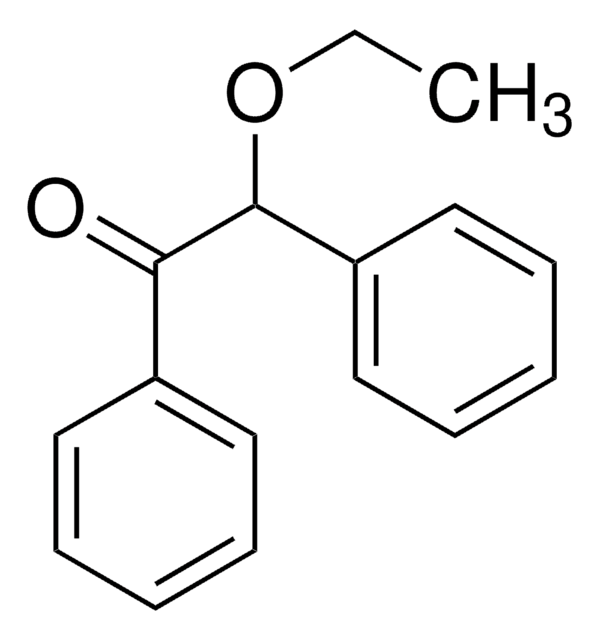196118
2,2-Dimethoxy-2-phenylacetophenone
99%
Synonym(s):
α,α-Dimethoxy-α-phenylacetophenone, Benzil α,α-dimethyl acetal
About This Item
Recommended Products
Assay
99%
mp
67-70 °C (lit.)
SMILES string
COC(OC)(C(=O)c1ccccc1)c2ccccc2
InChI
1S/C16H16O3/c1-18-16(19-2,14-11-7-4-8-12-14)15(17)13-9-5-3-6-10-13/h3-12H,1-2H3
InChI key
KWVGIHKZDCUPEU-UHFFFAOYSA-N
Gene Information
human ... ACHE(43) , BCHE(590) , CES1(1066)
Looking for similar products? Visit Product Comparison Guide
Related Categories
Application
- For the photopolymerization of methacrylate monomers in thick sections(~2mm).
- In the preparation of UV-curing silicone rubber with excellent mechanical properties and thermal stability via thiol-ene reaction.
Signal Word
Warning
Hazard Statements
Precautionary Statements
Hazard Classifications
Acute Tox. 4 Oral - Aquatic Chronic 3 - STOT RE 2
Target Organs
oral cavity
Storage Class Code
11 - Combustible Solids
WGK
WGK 2
Flash Point(F)
Not applicable
Flash Point(C)
Not applicable
Personal Protective Equipment
Certificates of Analysis (COA)
Search for Certificates of Analysis (COA) by entering the products Lot/Batch Number. Lot and Batch Numbers can be found on a product’s label following the words ‘Lot’ or ‘Batch’.
Already Own This Product?
Find documentation for the products that you have recently purchased in the Document Library.
Customers Also Viewed
Articles
With dentists placing nearly 100 million dental fillings into patients′ teeth annually in the U.S. alone, polymeric composite restoratives account for a very large share of the biomaterials market.
Our team of scientists has experience in all areas of research including Life Science, Material Science, Chemical Synthesis, Chromatography, Analytical and many others.
Contact Technical Service














